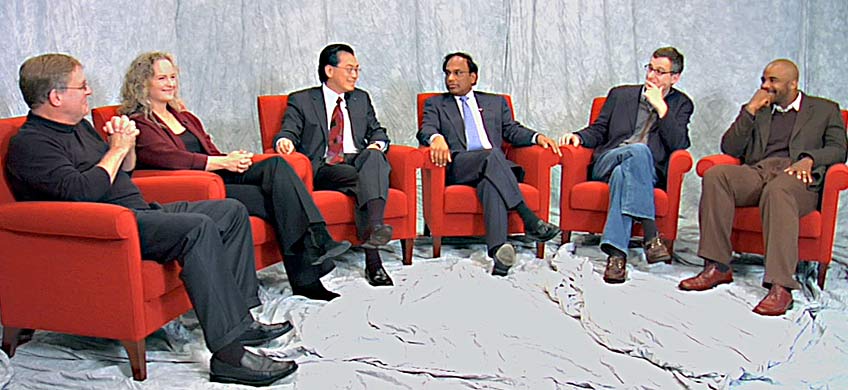
(page 6 of 7)
Margaret Moon: And I think it’s one that we can work to change.
Michael Vlahos: Right. Absolutely.
Michael Anft: What are we going to have to look forward to? As an editor of The New York Times is fond of asking: Where are the flying cars? What are the things that might offer us some hope, either in terms of devices or cancer cures or just our ability to somehow get on with these environmental and resource issues?
Michael Vlahos: The vision of The Jetsons was the high point, the apogee of American confidence and certainty of expectation. That world demanded ever-increasing energy consumption. Everything we have in this world is dependent on energy. We’re using up the creatures of the Cretaceous and the Triassic and the Jurassic and they’re all going to be gone. [Laughter] What I’d like to find out from people in the technology world is how we can effectively substitute for a decline in available energy. That’s a huge question. Unless we begin to really seriously confront this question now, we’re going to go back to a 1950 standard of living, or a 1930 standard of living, in the next several decades.
Yash Gupta: The standard of living doesn’t necessarily become affected if we’re more efficient in our consumption. And education is a big part of developing technologies and consuming energy more efficiently.
Chi Dang: This whole issue about Jetsons-type technology giving us more modern conveniences, I’m not sure that’s really that high of a priority. We definitely have innovations that could decrease mortality or morbidity from certain diseases, so people can actually age gracefully and die nicely. But really the priority has got to be energy. It’s not new gadgets to make us not have to do things.
Margaret Moon: Technologies can change the way we see ourselves as human, as well as change the way bodies work. They can change this notion of aging. How do we expect the nature of what it is to be human to change? How will technology help or hurt that? And again: How do we plan?
Denis Wirtz: Actually from a social point of view, it’s interesting to think about aging. We have to watch out what we wish for, because living longer may actually be a complete catastrophe. [Laughter]
Chi Dang: That’s why I said, “Age gracefully.”
Denis Wirtz: That’s right. [Laughter] And still die quickly. It could actually be a huge problem to see an aging population sticking around. You still have to be productive. The people are saying we should retire when we are 60 or 65. Maybe it should be 85 or 90. Again, this comes from fear—which is so primal, right?—of aging and what comes after that.
Yash Gupta: But at the same time the reality is technology does allow people to live better. There is the assumption that the average age will indeed continue to improve. Therefore, the aging question becomes a very valid one in the sense that if you live longer, someone has to be deprived of a certain amount of opportunity that existed before—unless opportunities themselves expand.
Nathan Connolly: The zero-sum thinking is really dangerous in terms of the innovation question. Innovation is great, but it’s the social application of innovation that’s really the question here. I mean General Motors has been sitting on the technology for a car that runs on water for quite some time. Everybody knows it but nobody can force the intellectual property out of that company. Cars that have the fuel efficiency of a Model T are the going rate right now in American society, which is outrageous. There’s no innovation, right? The fear driving entrepreneurship and innovation is wonderful, but when fear actually causes you to hoard that innovation and entrepreneurship, well then, we have a problem.
Margaret Moon: That gets back to our question: What do we mean by justice? And if we ask the question differently—instead of celebrating innovation, we question the injustice—would it change the way we innovate?
Chi Dang: I would personally fear that if we question justice that that would really diminish creativity. I think we need to sort of preserve that somehow but really pay more attention to justice.
Margaret Moon: I will never believe that by asking questions about justice we will stifle innovation or creativity. I just don’t think there’s anywhere in the world where those two problems co-exist.
Yash Gupta: How do we apply that innovation? Do we hoard it? You’re talking about the General Motors issue. It is not innovation itself that is the guilty party.
